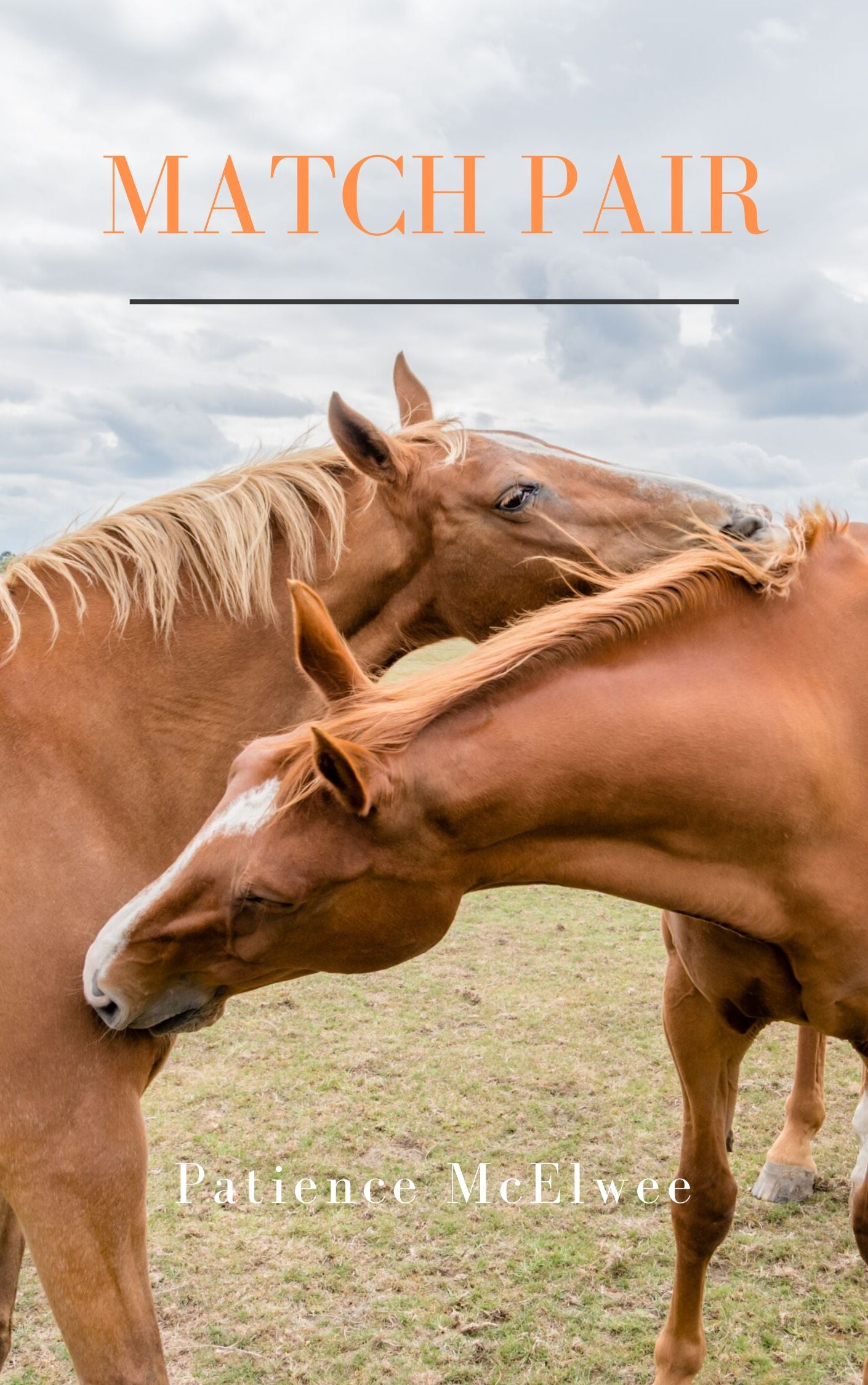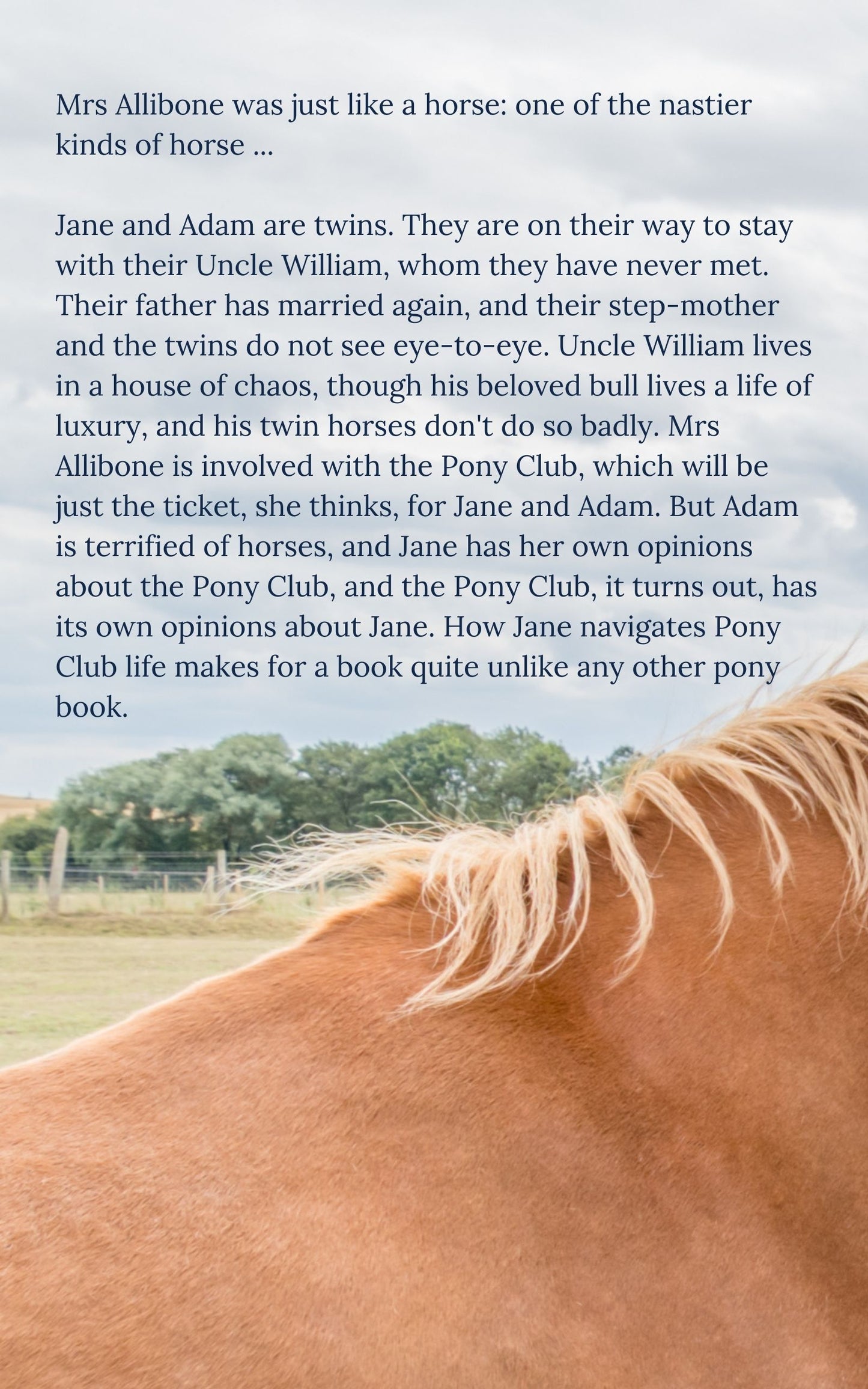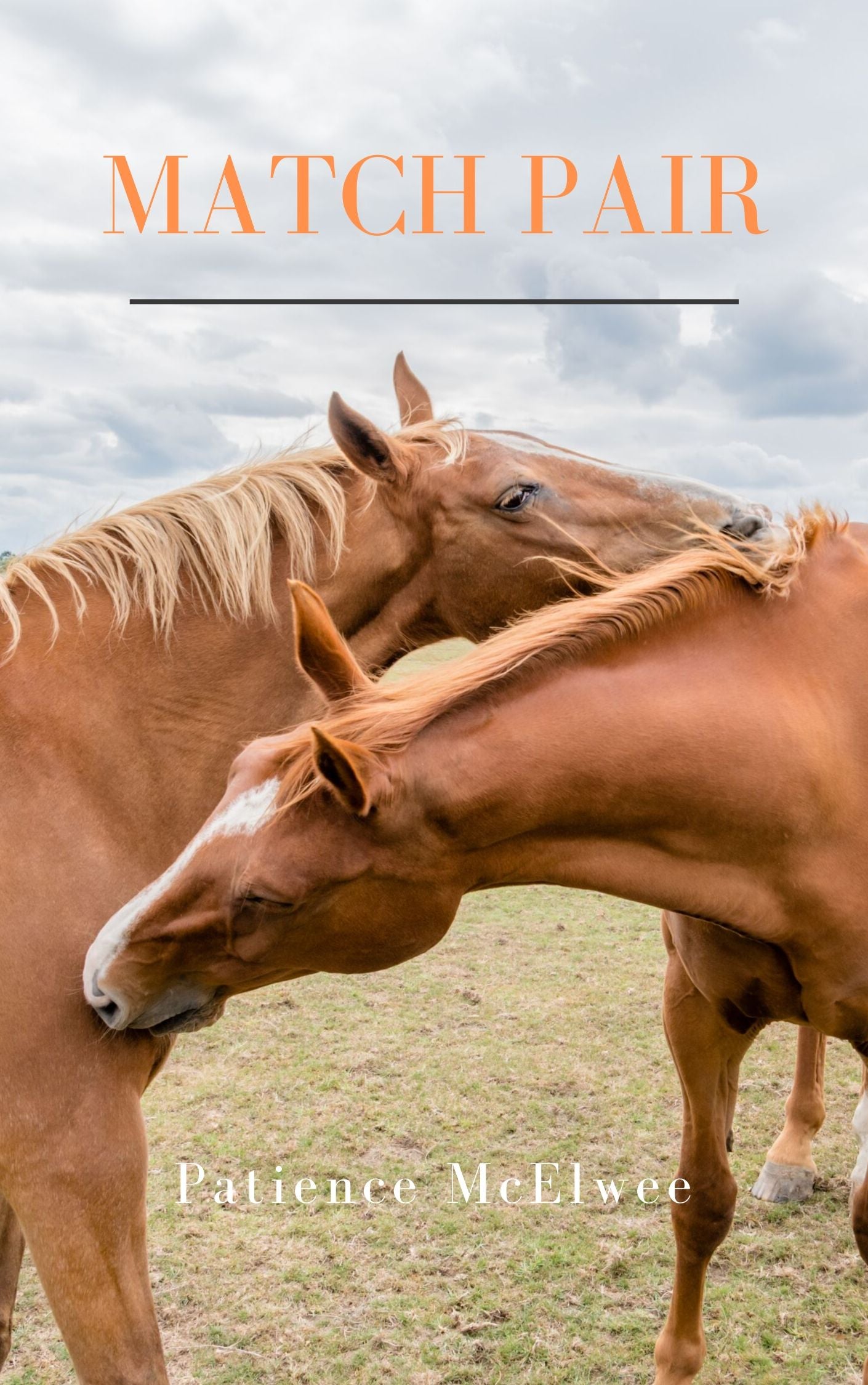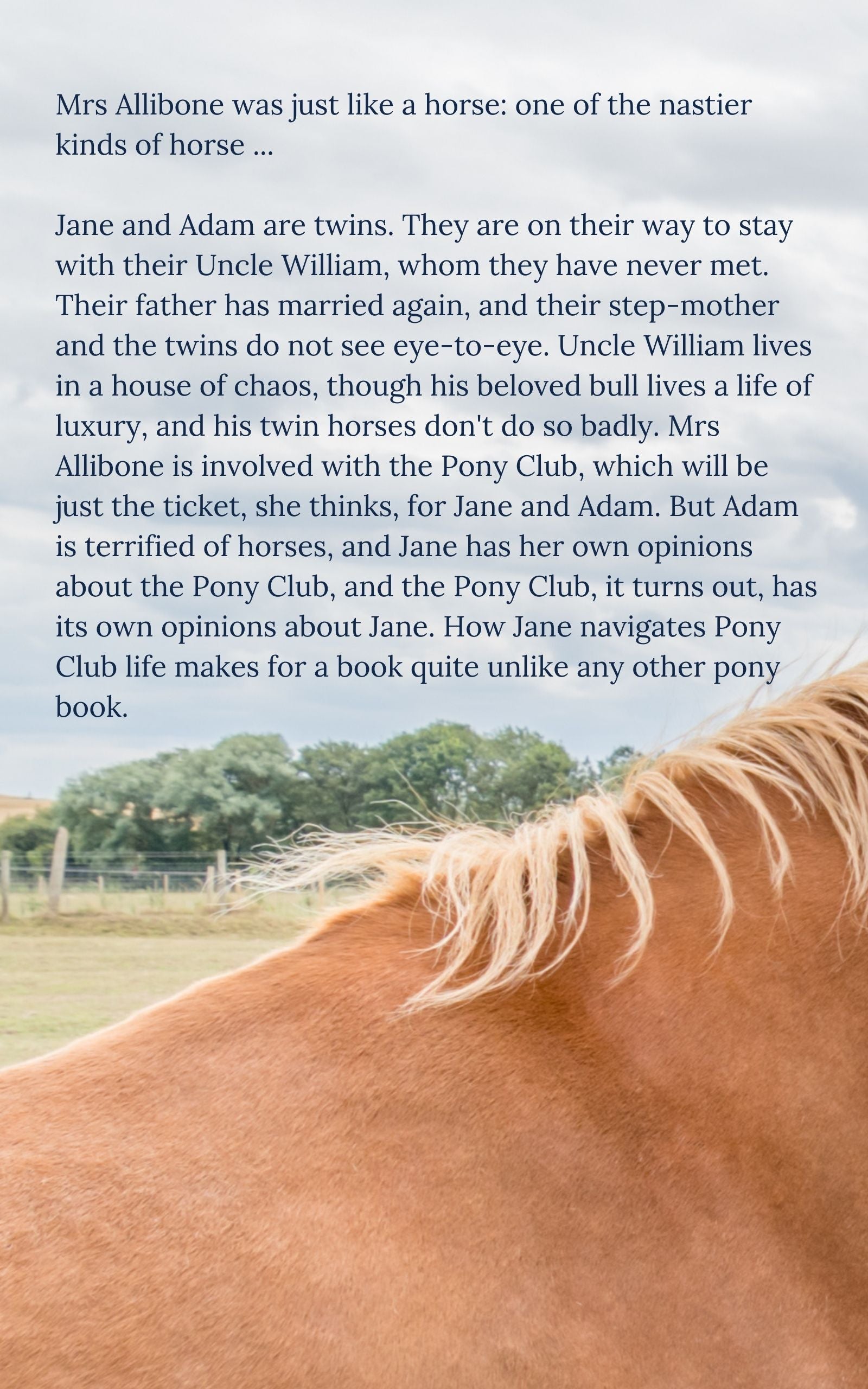Jane Badger Books
Patience McElwee: Match Pair (eBook)
Patience McElwee: Match Pair (eBook)
Couldn't load pickup availability
Share
Jane and Adam are twins. They are on their way to stay with their Uncle William, whom they have never met. Their father has married again, and their step-mother and the twins do not see eye-to-eye. Uncle William lives in a house of chaos, though his beloved bull lives a life of luxury, and his twin horses don't do so badly. Mrs Allibone is involved with the Pony Club, which will be just the ticket, she thinks, for Jane and Adam. But Adam is terrified of horses, and Jane has her own opinions about the Pony Club, and the Pony Club, it turns out, has its own opinions about Jane. How Jane navigates Pony Club life makes for a book quite unlike any other pony book.
Page length: 167
Original publication date: 1956
How do I get my book?
How do I get my book?
There's a link to download in your confirmation email. If you need help, the email from Bookfunnel, who handle our delivery, will walk you through downloading the file that works best for you.
How do I read my eBook?
How do I read my eBook?
You can read the ebooks on any ereader (Amazon, Kobo, Nook), your tablet, phone, computer, and/or in the free Bookfunnel app.
Read a sample
Read a sample
Adam and I are twins, alike as two peas in a pod, except that I have a front tooth missing, which is a pity, being a girl.
As it is, people say that Adam is too beautiful to be a boy and the old-fashioned ones call me a tomboy and the others, our stepmother’s friends, think I’m like something out of a horror comic. Our stepmother, who keeps herself very thin, so that people think she is too delicate to do anything except go to parties in the most lovely clothes, has never seemed to take to either of us very much. She says “Well, chicks?” in a vague sort of way if we happen to cross her path, but we’ve always had the impression, right from the start, that she’d prefer our room to our company, and so our father, too, began to take the attitude that children should not only not be heard, but preferably not seen either.
Which was why, no doubt, we found ourselves crossing from America to England to go and live with our Uncle William.
We didn’t enjoy the crossing much, though at first it seemed wonderful that we should be away on our own, leaving the hot, smart place we never remembered to call an apartment instead of a flat, leaving the school we disliked because it seemed so unnatural to be at it together, and to get away from all the endless fussing and rules made to keep us out of our parents’ way.
Father is rather an important person and had been sent over to America on what was called a Mission. When I heard the word “mission” I thought of Dr Livingstone, but it wasn’t that sort of mission at all, nor, come to that, was Father one’s idea of a missionary. Adam said it was political and that we’d better not talk about it, politics being, it seemed, akin to all the other things best not talked about, at least in front of Mademoiselle, who looked after our stepmother’s clothes and nervous system and gave us our cornflakes at the supper we had so horribly early to get us out of the way. You couldn’t mention, for instance, if a dog you knew was expecting puppies, and never, on any account, what anything cost. At least, we weren’t allowed to mention things like that, and that was another reason why we disliked school, because being prigs and cissies made us different from the others even more than being English.
We found we were different on the boat too, and that was why we didn’t enjoy the crossing, which seemed, when we first stepped on board, as if it would be the gateway to freedom. The English travellers thought we were American, because of our clothes and the things we had got used to eating, and the Americans thought we were dumb, sly little things, upstage and not real cute at all. I suppose really the answer is that nobody likes children of fourteen whatever their nationality and habits, as you can’t say what you want in front of them and they’re too old to be played with and make quaint remarks.
Most of our time, of course, was taken up with wondering what Uncle William would be like. We felt he must be terribly old—“You are old, Father William, the young man said, and your hair has become very white.” I read too many books—I was told that by everyone, even though there was nothing to do in the flat—I mean, apartment—except read—and so I had a muddled up picture in my mind of a Wicked Uncle, a miser, Old Father William incessantly standing on his head, and Cedric’s grandfather in Little Lord Fauntleroy. Adam was more scholarly than me, and thought about King John and Richard III, and by the time we reached Southampton, with frightful inferiority complexes because we wore blue jeans and didn’t like deck games, he was ready to think we were bound to be murdered in the long run, if we escaped having our eyes put out first.
Mrs Allibone, who had been at school with our step-mother’s cousin and was supposed to look after us on the boat, said over and over again that she was sure our uncle would be splendid, as our father was so good-looking, the best type of soldier, though we assured her equally often that Uncle William was our mother’s brother and therefore couldn’t resemble our father in any possible way. Which was a relief to us in most ways. Father—we were never allowed to call him anything else, I suppose because he thought we might get into the habit of calling him Pop—was always telling Adam to stand up straight and show some gumption and me that I was a grubby little hooligan.
Mrs Allibone was going to what she called drop us off at Uncle William’s house. It was called Stone House. which depressed Adam even more, because it sounded as if it might have a dungeon where other people had cellars and terribly thick walls that would muffle all cries for help.
We hoped Mrs Allibone—she asked us to call her Fay, but we could never remember, not having been brought up that way—would say she must have a cup of real English tea and a good old railway station Bath bun before proceeding on our way, but she didn’t. There was a car to meet her and she whisked us into it at once and it drove away without a backward glance at any of the eating-places, which all looked a bit shut and unwilling to feed us after the American ones, which blazed with lights and tempting advertisements and where you could help yourself, always supposing you had enough money to pay for what you took.
It was the rich kind of car that always made poor Adam feel sick, and he turned greener and greener, and I could feel him adding to his other worries by wondering if Uncle William would have a car like this and make us drive to church with him, the one where you couldn’t ask if you could go to the bathroom. Stone House, we had decided, would be miles from anywhere, and we wouldn’t be able to move a step except in a Rolls or a Daimler, smelling of rich upholstery and gliding along on horrid, spongy springs.
He went to sleep on my shoulder after a bit, and Mrs Allibone said he wasn’t his father’s son, was he?—and repeated the statement that our father was every inch a soldier. I resented that, as I always did resent people criticising Adam. It was bad luck, and not his fault, that he hated heights and meeting strangers and above all riding.
Father was very keen on our riding, and we bumped about twice a week at a smart riding school kept by a tough English person called Marion Grice. Marion Grice said I was her best pupil and because of that Father was merely gratified when I came back one day minus a front tooth.
My stepmother said it ruined what looks I had, but before anything could be done about it by one of those American dentists who wear white coats and look like clinical sort of Cossacks and are supposed to be the best in the world, necessarily, Father said, because of all the ice-water people drink, Father’s Mission came to an end and he was appointed to somewhere else.
As far as we could disentangle from Mademoiselle’s torrents of French, the climate of wherever it was was too bad and the conditions too unsettled and what grown-up people called “educational facilities” totally lacking, so that we couldn’t go with them, which was why we had been shipped off to live with Uncle William whether we liked it or no, or, for that matter, Uncle William either. Nobody knew what educational facilities there were round Stone House, and it was too late to send Adam to a public school to be made a man of, at least to the kind of school Father would have thought worthy of his son. Our stepmother, who could not, I suppose, be expected to take much interest in our future, said quickly there’d be a Vicar and that he could teach us both, but we hadn’t got round to worrying about a Vicar we did not know for certain existed.
As we got nearer to Stone House I began to get nervous myself, because I knew Adam was dreading it, and Mrs Allibone tried to cheer me up by saying how much we were going to enjoy country life in England after being what she called Out There. She told me about her daughter, Amanda, who I at once began to hate, and how much she enjoyed the Pony Club, which was run by somebody called Diana Jardine, though she didn’t say if she was Mrs or Miss. I thought to myself she would turn out to be exactly like Marion Grice, only even bossier and tougher, because she didn’t have to earn her living and thus sometimes feel she had to keep her clients in a good temper and not let too many children go home without their front teeth.
I was glad Adam was still asleep. I thought would dread Mrs or Miss Jardine even more than Uncle William and the dungeon.
Amanda, Mrs Allibone went on, simply adored every minute of Pony Club Camp, which was like the jolliest kind of school imaginable and splendid for what she called Onlies, of which Amanda apparently was one.
In all the school books I had read, from the rich store my mother had left, anyone called Amanda Allibone would have been teased almost to death, and I thought that Adam was really very silly to be ashamed of being called Adam. Luckily my parents hadn’t been foolish enough to call me Eve, which would have been too much of a good thing, but only Jane, which is quite ordinary.
Mrs Allibone said, as if she was offering us some tremendous treat, that we should meet Amanda quite soon, as they lived in the same country. That mystified me, but I found out later that people who hunt always talk about different countries even if a place is only a few miles away. She said she hoped we’d all see a lot of each other, and it occurred to me that she might have marked down Uncle William, not thinking he’d have white hair and be grim and miserly, as a possible third husband.
I could see why our stepmother had married twice, because she was very good-looking and always what Mademoiselle called bien soignée, which was, I was given to understand, the very opposite of my own appearance, but Mrs Allibone was just like a horse: one of the nastier kinds of horse belonging to Marion Grice.
That was one of the reasons it was impossible to remember to call her Fay. She should have been called one of the brisk hearty names people bestow on mares. She was very rich, of course, judging by her car, and perhaps if Uncle William were a miser he’d like that and be prepared to put up with the rough of her and Amanda in return for the smooth of her money.
The roads had become lanes and the car no longer glided along so smoothly and upsettingly and Adam woke up and it was plain that he thought for a moment he was still on the Queen Mary.
At last we came to an even smaller and ruttier lane that had a signpost at its mouth saying Private Road to Stone House. I was surprised not to see a notice underneath saying Trespassers will be Prosecuted. Beware of the Dog. Concealed Mantraps.
Mrs Allibone twitched her hard felt hat to a different angle, though it made things no better, asked me if I’d got a comb, and remarked that Adam looked a bit peaky.
“Excitement, I expect,” she said, meaning she was mad to see Uncle William herself.
The car lurched and bumped in and out of the ruts and the chauffeur got out and opened a ricketty wooden gate as though he were afraid of catching something, and I told myself that if Mrs Allibone wanted Amanda to become our bosom friend, the sprat to catch the whale Uncle William, she would have to drive the car herself or else buy a jeep and pay her calls in that. We went up a short drive that was in even worse repair than the lane, and behind a lot of overgrown and rather funereal bushes and shrubs was Stone House itself.
It wasn’t in any way like Pomfret Castle or the Tower of London, at least from the outside, but just an ordinary tall house with stucco on it and a porch that looked as if it would fall down on your head if you rang the bell at all hard.
We had to ring the bell hard in the end, because nobody came in answer to our first genteel attempts. The whole place was as silent as a churchyard, stewing there in the hot afternoon sun, and after a bit I could sense Adam imagining Uncle William dead in bed, probably murdered by his housekeeper before she absconded with his entire fortune stuffed into old socks. I myself was bitterly regretting all the hundreds of tea shops, hotels and Cosy Cafés we had left unvisited behind us on the way from Southampton.
After we had made a good deal of noise in case Uncle William’s butler or parlour-maid were deaf, though to me it looked the kind of house that wouldn’t rise beyond what our stepmother’s friends slightingly called a hired girl, and nothing happened in reply, not even the distant bark of a savage, chained-up mastiff, Mrs Allibone resigned herself to the fact that Uncle William was out, because no doubt in what she called her country sudden death was a rarity and it clearly had not entered her head he might be lying stark on a four-poster bed. She told us breezily we must walk in and make ourselves at home, but, after calling out that we must get together with Amanda, she drove away before she had to be an accomplice to our house-breaking,
I thought for one awful minute Adam was going to cry, and that would have been dreadful for him, because although everyone always said crossly that I was as tough as old boots, Father had told him that a decent boy always stood up for his sister, and though no doubt it hadn’t occurred to Father that our first action on reaching our English home would be to burgle it, he would, had he known it, expect Adam to take the initiative, opening the rusted-up scullery window with his clasp knife from the vantage point of a crumbling foothold in the stucco.
Who's in the book?
Who's in the book?
Humans:
The twins: Adam and Jane Howell; their father and stepmother, Uncle William, Mrs Allibone, Amanda Allibone, Diana Jardine, Philip and Elizabeth Death, Mrs Death, Prudence
Equines:
Harridan, Harpy
Other titles published as
Other titles published as
Series order
Series order




